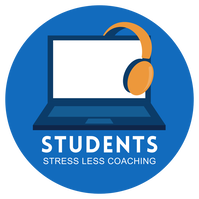Welcome to the blog
The Students Stress Less Coaching blog has a wealth of FREE resources, ranging in topics from executive function skills to exam prep. Enjoy.
 This is the time of year we get to spend lengthy and wholesome quality time with our college student. Although they may hold a job over the holidays or sleep in until 2pm, we will treasure the moments they are around. Still, we may struggle with how to approach certain topics with them. In our minds, they are home for a short time, and it is probably best to let “it” go. The opposite is actually true. There is no time like this holiday break to talk to your college adult about adult topics. Most of our kids are over the chronological age of eighteen. To most this translates into: “they should feel and act like adults and be as responsible as adults". Right? Again, the opposite is true. Years of research in neuroscience has proven that the prefrontal cortex of the brain (the part responsible for complex cognitive processes such as reasoning, problem-solving, and planning) doesn’t fully develop until ages 22-25. With this knowledge, we also know that personalities are still in the forming stages, negative impulses are not always controlled, and impulse control and judgement are effected from time to time. They do a great job and may not want our presence in their lives, but they need our guidance from time to time and if nothing else, we can listen while we lead and guide conversations. After living on their own for some time at this point, coming home for breaks means many things for our college student. It means little responsibility, less decision-making, deflating mentally, and sheer enjoyment and happiness about life. We often see our children the happiest after a few days of holiday breaks because physically and emotionally, they are back to neutral, down from the cortisol high. There is no better time after they decompress to bring up sensitive topics. They will be more open, more receptive, and will likely remember the conversations. Most of what we, as parents, want to talk about is….life. In our house, “life” means many things, but primarily wellness and grades. Grades are something we check on every few weeks with our college kids just to let them know we still have expectations, but wellness is something that encapsulates so many parts of life that we need time to check on all of things that fall into the wellness category: sleep habits, food choices, exercise, outlets for stress, social ability, genuine happiness, spirituality, drug and alcohol, and signs and symptoms of anxiety and depression. There may be some concerning issue you have about your child and the decisions they are making and it brings you great pain thinking about how to present your concern. You may be scared, nervous, or even shy about letting your child know what you have noticed. It may be changes in behavior. Changed is appearance. Changes in motivation. It could just be your imagination! But, our college kids need to know we make parental observations. They will present they “don’t need you anymore.” After all, in their twenty something minds, “I’m okay. I don’t need mom or dad anymore. I can do this on my own.” This thought process can look great on some, but for others, it is the beginning of a deep insecurity. This is when we pay close attention and may need to wiggle our presence into their lives. You bet you will get shot down, be ignored, or even yelled at, but the idea is to make your child aware that YOU notice changes, yet compassionately convey your care and concern. They love hearing that you KNOW they have been operating at a high level of stress. There are good ways to “discuss” unhealthy habits, poor choices, and negative outcomes of behavaiors, and there are ways that will bring you true failure. So let’s stick with the best and most successful ways to open up lines of communication. Most importantly, do not place blame. Remain supportive and communicate your true disquiet for the stress they endure. Lines like this are great: “I can only imagine how stressed you must have been with your schedule this semester. (Pause, listen). Were you able to go to the gym to work out some of that stress? Did you chose clean eating to help your body and brain?” “I know how hard it must have been for you to make good choices all of the time. It’s exhausting.” In addition, be sure to recognize efforts of clean living and wellness, and acknowledge any and all attempts of caring to be “healthy”. Here are some other ways you can be sure of success when talking with your college student this holiday season. 1. Use relating stories such as this: “When I was your age, I ate boxed macaroni and cheese three times a day because I did not want to go to the café. By my sophomore year, I had gained twenty pounds.” “I knew this kid in college (true story) who ate only cereal for an entire year because she wanted to lose weight.” “Have you been able to go to any of the programs offered at the Wellness Center or the gym? I hear they offer yoga and that worked for you before college.” 2. Listen to their story after you introduce an idea. Sometimes as parents we do not have to say a thing. All our child wants is our ear and our validation. Keep questions to a minimal, but ask in a way that shows intention and action, like: “What can you change about your eating for next semester?” " How can you get better sleep when you go back to school?" 3. Help them make a flexible holiday plan that includes a balanced diet, exercise, fun, and downtime. And, if you have time, join them. Make clean and green foods readily available and visible. Lemons (in water) are great for cleansing. Suggest they try this schedule once they return to campus. 4. Really gauge sleep habits without being worried. It is a known fact that they need to catch up on good, solid, REM sleep. Hopefully by the time they go back to school, their brains and bodies will be replenished. 5. Multivitamin? 6. Make sure you offer suggestions for and encourage down time: movie, shopping, reading, painting, fishing, skateboarding, visiting, baking, singing, dancing…whatever warms their soul. These things truly revive them, not to mention joining them on these ventures presents an ideal venue for heathy discussions. 7. Let them know you have some expectations. Keep in mind that they have had it rough, but when they are home, they can participate in the family schedule. 8. Encourage them to talk, vent, express their worries, cry or complain. Every student is different with how they decompress. Only you know how to foster that. 9. Encourage whatever makes them act like their inner child. Our young adults are expected to be perfect and to perform on such a high level all of the time. It is fine that they color, watch cartoons, or play video games while they are home. 10. Make an informal list of things that you want to know about and present it to them, saying, “I’ve been meaning to ask you about your energy level, but we have both been so busy. How are you feeling at school?” Or, “Are you choosing plenty of protein foods when you eat at the café?” This shows them you sincerely care when it comes to their wellness. These are just “ice breakers”. I am sure many of you have your routines and ways that have worked for years when it comes to talking about sensitive topics. College has a way though of changing some of the easier ways of communication as our child strives for independence. We may be “uninvited” or ignored, but we are successful just by listening, gauging our thoughts, and figuring out the best way to convey our concerns. Underneath all of the “I’m okay, Mom. I can do this by myself.”, there is still that desire for us to be visible, protective and available. Happy holidays! Lori M. Bender, MSW Professional Wellness and Life Coach for College Students Owner of Carolina Lifestyle Coaching and Consulting, LLC "Helping college students stress less." [email protected] www.carolinalifestylecoachingandconsulting.com (540) 256-2589 On FB-free support
0 Comments
Leave a Reply. |
|
